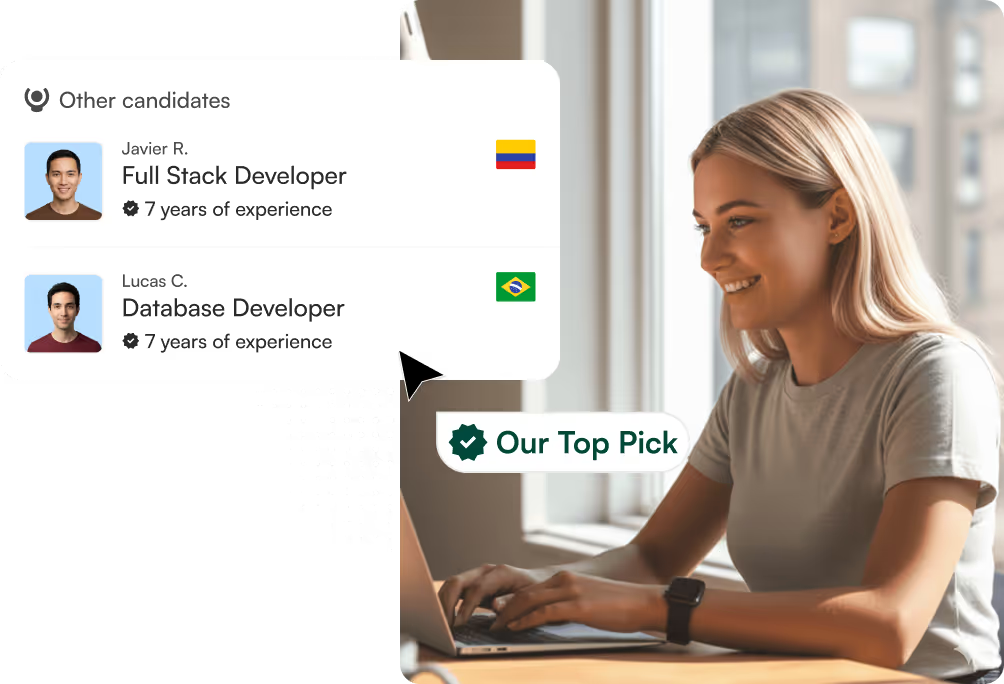What Is a Remote Closer, and How to Become a One: Salary & FAQs


Lupa will help you hire top talent in Latin America.
Book a Free Consultation
Lupa helps you build, manage, and pay your remote team. We deliver pre-vetted candidates within a week!
Book a Free ConsultationIn today's digital-first business landscape, the role of a remote closer has emerged as one of the most sought-after positions in sales. As companies continue to embrace remote work models, understanding the remote closer salary potential and career path has become essential for professionals looking to thrive in this field. This comprehensive guide will walk you through everything you need to know about remote closers, from typical compensation structures to the skills required for success, and how to maximize your earning potential in this dynamic career.
What is a Remote Closer?
A remote closer is a sales professional who specializes in finalizing deals and converting prospects into customers without face-to-face interaction. Working from a home office or any location with reliable internet access, remote closers leverage various digital communication channels to close sales effectively. Unlike traditional sales roles that rely on in-person meetings, remote closers conduct their entire sales process virtually through phone calls, email, video conferencing, and text messaging.
The flexibility of this role allows professionals to work from virtually anywhere in the world while maintaining full productivity. Remote closers can operate independently as freelancers or as part of a company's sales team, depending on their preference and career goals.
It's important to distinguish between closers and setters in the sales ecosystem. While setters focus on lead generation and scheduling appointments, closers take over once a prospect shows interest, guiding them through the final stages of the sales process to conversion. This specialization allows remote closers to focus exclusively on what they do best: closing deals.
Remote Closer Responsibilities and Required Skills
Key Responsibilities
Remote closers shoulder several critical responsibilities that directly impact a company's revenue generation:
- Conducting sales presentations: Delivering compelling, personalized presentations that address client needs and showcase product value
- Building client relationships: Establishing trust and rapport with prospects through virtual communication
- Negotiating deals: Navigating price discussions and contract terms to reach mutually beneficial agreements
- Addressing objections: Skillfully overcoming prospect concerns and hesitations
- Closing sales: Finalizing transactions and securing commitments
- Providing customer service: Ensuring client satisfaction throughout the sales journey
- Maintaining accurate records: Documenting interactions and outcomes in CRM systems
- Collaborating with team members: Working with setters, marketers, and other departments to optimize the sales pipeline
Essential Skills for Success
To excel as a remote closer and command a competitive remote closer salary, you'll need to develop and refine these critical skills:
- Communication skills: Exceptional verbal and written communication abilities are fundamental, as all interactions occur virtually
- Negotiation expertise: The ability to navigate complex discussions and reach favorable outcomes
- Self-motivation: Discipline and drive to perform consistently without direct supervision
- Adaptability: Flexibility to adjust approaches based on different client personalities and situations
- Resilience: Mental toughness to handle rejection and maintain enthusiasm
- Technology proficiency: Comfort with various digital tools including CRM software, video conferencing platforms, and communication tools
- Emotional intelligence: The capacity to read people's emotions and respond appropriately, even in virtual settings
- Attention to detail: Precision in following up and managing multiple prospects simultaneously
Essential Tools for Remote Closers
Remote closers rely on various technological tools to perform effectively:
- CRM software: Platforms like Salesforce, HubSpot, or Pipedrive for tracking prospects and managing relationships
- Video conferencing tools: Zoom, Google Meet, or Microsoft Teams for face-to-face virtual meetings
- Communication platforms: Slack, Microsoft Teams, or Discord for internal team collaboration
- Prospecting tools: ZoomInfo, Outreach, or Apollo for identifying and connecting with potential clients
- Document management: DocuSign, PandaDoc, or Adobe Sign for handling contracts and agreements
Average Remote Closer Salary
The remote closer salary range in the United States is notably wide, reflecting the performance-based nature of the role. Based on current market data, here's a comprehensive breakdown of what remote closers can expect to earn:
National Average Salary
The national average remote closer salary in the United States typically falls between $80,000 and $105,000 annually. This translates to approximately:
- Hourly rate: $38-$50
- Weekly earnings: $1,500-$2,000
- Monthly income: $6,500-$8,750
However, these figures represent only base compensation and don't account for commission and bonus structures that can significantly increase total earnings.
Salary Range from Entry-Level to Experienced
The full spectrum of remote closer compensation ranges from approximately $29,000 for entry-level positions to upwards of $180,000 for top performers with extensive experience and proven results. This wide range demonstrates the significant earning potential for those who excel in this role.
Salary Distribution by Percentile
- 25th percentile: $55,000 (typically entry-level closers or those in lower-paying industries)
- 50th percentile (median): $92,000
- 75th percentile: $125,000
- 90th percentile: $150,000+ (top performers with exceptional closing rates)
It's worth noting that remote closers often receive substantial additional compensation beyond their base salary, including performance bonuses, commission structures, and benefits packages that can increase total compensation by 30-100% depending on individual performance and company policies.
Salary Distribution and Earning Potential
The distribution of remote closer salary figures reveals interesting patterns about the profession's earning potential. According to industry data, remote closer salaries tend to cluster in several distinct ranges:
- $30,000-$50,000: Approximately 15% of remote closer positions fall in this entry-level range
- $50,000-$80,000: About 25% of positions offer salaries in this mid-range bracket
- $80,000-$120,000: The largest segment, representing roughly 35% of remote closer roles
- $120,000-$150,000: Approximately 15% of positions reach this higher compensation tier
- $150,000+: About 10% of remote closers earn in this top bracket
This distribution demonstrates that while entry-level positions exist, the majority of remote closer roles offer solidly middle to upper-middle-class earnings. The significant percentage of positions paying over $120,000 indicates substantial room for advancement and earning growth.
The approximately $150,000 difference between the lowest and highest earners in this field highlights the tremendous upside potential for those who develop expertise, specialize in high-value industries, and consistently deliver results. This wide range also reflects the meritocratic nature of sales roles, where performance directly impacts compensation.
Geographic Variations in Remote Closer Salaries
Despite the location-independent nature of remote work, geographic factors still influence remote closer salary levels. This seemingly counterintuitive reality stems from several factors:
- Company headquarters location: Many employers base salary scales on their primary location, even for remote workers
- Cost of living adjustments: Some companies adjust compensation based on where remote employees reside
- Local market competition: Areas with high concentrations of sales talent may see different compensation trends
- Regional industry specialization: Certain regions have higher concentrations of lucrative industries
Top-Paying Locations
Based on current data, these locations offer the highest average remote closer salary figures:
- New York: 15-20% above national average
- California: 10-18% above national average
- Massachusetts: 8-15% above national average
- Washington: 5-12% above national average
- Colorado: 3-10% above national average
Lower-Paying Locations
Conversely, these regions typically offer lower compensation for remote closers:
- Mississippi: 15-20% below national average
- Arkansas: 12-18% below national average
- South Dakota: 10-15% below national average
- West Virginia: 8-12% below national average
- Idaho: 5-10% below national average
The difference between the highest and lowest-paying locations can amount to a 30-40% variation in base salary for otherwise identical positions. Remote closers can strategically leverage this geographic arbitrage by living in lower-cost areas while working for companies based in high-paying regions, potentially maximizing both income and purchasing power.
Industry-Specific Remote Closer Salaries
The industry in which a remote closer works significantly impacts their earning potential. Here's a breakdown of remote closer salary expectations across various sectors:
Technology and SaaS
- Average salary range: $90,000-$150,000
- Commission structure: Typically 10-20% of deal value
- Why it pays well: High-value products, recurring revenue models, and growth-focused companies
Financial Services
- Average salary range: $85,000-$140,000
- Commission structure: Often 5-15% of managed assets or loan values
- Notable aspect: Regulatory requirements create barriers to entry, increasing value of experienced closers
Real Estate
- Average salary range: $75,000-$130,000 (highly variable based on market)
- Commission structure: Usually 1-3% of property value
- Earning pattern: Often feast-or-famine with significant seasonal variations
Healthcare and Pharmaceutical
- Average salary range: $80,000-$135,000
- Commission structure: Typically 8-15% of contract value
- Industry advantage: Specialized knowledge requirements command premium compensation
B2B Services
- Average salary range: $70,000-$120,000
- Commission structure: Generally 7-12% of contract value
- Key factor: Longer sales cycles but higher average deal values
E-commerce
- Average salary range: $65,000-$110,000
- Commission structure: Often 5-10% of sales value
- Growth potential: Rapidly expanding sector with increasing demand for skilled closers
Education and Training
- Average salary range: $60,000-$100,000
- Commission structure: Typically 8-15% of program value
- Market condition: Growing demand for online education solutions
The technology, financial services, and healthcare sectors consistently offer the highest compensation for remote closers due to their complex products, high transaction values, and the specialized knowledge required to effectively sell in these spaces. Remote closers looking to maximize earnings should consider specializing in these higher-paying industries, particularly if they have relevant background knowledge or transferable skills.
Experience and Education Impact on Remote Closer Salaries
Experience level and educational background significantly influence a remote closer's earning potential. Here's how these factors affect remote closer salary expectations:
Experience Level Impact
- Entry-level (0-2 years)
- Salary range: $35,000-$60,000 base
- Total compensation: $45,000-$75,000 with commission
- Typical roles: Junior closer positions, often with more structured training and supervision
- Mid-career (3-5 years)
- Salary range: $60,000-$90,000 base
- Total compensation: $75,000-$120,000 with commission
- Career advantage: Established track record enables negotiation for better compensation packages
- Experienced (6-10 years)
- Salary range: $90,000-$120,000 base
- Total compensation: $110,000-$160,000 with commission
- Value proposition: Proven closing abilities and industry knowledge command premium compensation
- Senior (10+ years)
- Salary range: $110,000-$150,000+ base
- Total compensation: $140,000-$200,000+ with commission
- Career advantage: Often handle highest-value accounts and most complex sales scenarios
Educational Background Impact
While sales success ultimately depends more on performance than formal education, certain educational credentials can influence starting salaries and career advancement:
- High school diploma/GED
- May start at lower compensation but can advance based on performance
- Practical sales experience often outweighs educational limitations
- Bachelor's degree
- Typically commands $5,000-$15,000 higher starting salary
- Degrees in business, marketing, communications, or psychology particularly valued
- Opens doors to more competitive positions
- Master's degree (MBA, etc.)
- Can increase starting salary by $10,000-$25,000 in some industries
- Particularly valuable in technical, financial, or healthcare sales
- Often accelerates path to management positions
Valuable Certifications
Specialized certifications can enhance a remote closer's value and compensation:
- Certified Professional Sales Person (CPSP)
- Certified Inside Sales Professional (CISP)
- MEDDIC Sales Methodology Certification
- Sandler Sales Training Certification
- Industry-specific certifications (particularly valuable in technical fields)
These credentials typically boost earning potential by 5-15% and can be especially valuable for remote closers without extensive formal education or those looking to transition between industries.
Commission Structures and Performance-Based Compensation
For most remote closers, commission and performance-based incentives form a substantial portion of their total compensation. Understanding these structures is crucial for evaluating the true earning potential of a remote closer salary package.
Common Commission Models
- Straight Commission
- Structure: No base salary; income derived entirely from sales performance
- Commission rate: Typically higher (15-40% of sale value)
- Best for: Experienced closers with high confidence in their abilities
- Risk level: Highest risk but highest potential reward
- Base Salary Plus Commission
- Structure: Guaranteed base salary with additional commission on sales
- Commission rate: Moderate (5-20% of sale value)
- Base/commission ratio: Typically 60/40 or 50/50 split of total target compensation
- Best for: Most remote closers; provides stability with performance incentives
- Tiered Commission Structure
- Structure: Commission percentage increases as sales targets are achieved
- Example: 5% on first $100K in sales, 7% on next $100K, 10% on anything beyond
- Advantage: Rewards top performers with accelerating earnings
- Draw Against Commission
- Structure: Advance payment recovered from future commissions
- Purpose: Provides income stability during ramp-up periods
- Caution: Creates potential for "commission debt" if performance lags
Realistic Commission Expectations
Commission percentages vary significantly by industry:
- High-ticket sales (luxury goods, real estate): 1-6% of sale value
- SaaS and technology: 8-20% of first-year contract value
- Financial services: 5-15% of assets or loan value
- Insurance: 10-25% of first-year premium
- Consumer products: 10-30% of sale value
Performance Metrics That Determine Commissions
Remote closers are typically evaluated on several key performance indicators that determine their commission earnings:
- Closing ratio: Percentage of leads converted to sales
- Average deal size: Value of typical transactions
- Sales cycle length: Time from lead to close
- Customer retention: Renewal rates for subscription products
- Upselling/cross-selling success: Additional value generated from existing customers
Top-performing remote closers who excel in these metrics can earn 2-3 times the compensation of average performers in the same role, highlighting the significant upside potential in this career path.
Job Market Outlook for Remote Closers
The job market for remote closers continues to evolve, with several key trends shaping future opportunities and remote closer salary expectations.
Growth Projections
According to industry data, sales roles including remote closers are projected to grow approximately 4% through 2031, creating thousands of new positions annually. However, this modest overall growth rate masks significant variation across industries:
- Technology and SaaS: 10-15% growth (much faster than average)
- Healthcare: 8-12% growth
- Financial services: 5-8% growth
- Retail: 1-3% growth (slower than average)
Impact of Remote Work Trends
The post-pandemic shift to remote work has dramatically expanded opportunities for remote closers:
- Geographic liberation: Companies now hire remote closers from anywhere, expanding the job market
- Increased acceptance: Businesses have grown more comfortable with remote sales processes
- Technology adoption: Widespread use of video conferencing and digital sales tools has normalized virtual closing
Industry Hiring Trends
These industries are currently showing the strongest demand for remote closers:
- SaaS and technology: Continued rapid growth and product proliferation
- Healthcare technology: Expanding digital health solutions market
- Financial technology: Growing adoption of digital financial services
- E-learning and education: Accelerated shift to online education models
- E-commerce: Sustained growth in online retail platforms
Competitive Landscape
Competition for remote closer positions varies by industry and experience level:
- Entry-level positions: Highly competitive, with many candidates transitioning from other sales roles
- Specialized industries: Less competition for closers with specific technical knowledge or industry expertise
- High-performing closers: Always in demand, with companies actively recruiting proven top producers
To stand out in this competitive landscape, aspiring remote closers should develop specialized industry knowledge, build a demonstrable track record of sales success, and cultivate a strong professional network.
How to Become a Remote Closer
Breaking into the remote closing field requires a strategic approach to skill development, experience building, and job searching. Follow these steps to launch your career and maximize your remote closer salary potential:
Educational Pathways
While no specific degree is required to become a remote closer, these educational backgrounds can provide valuable foundations:
- Business or marketing degree: Provides relevant theoretical knowledge
- Communications or psychology: Develops understanding of human behavior and persuasion
- Industry-specific education: Particularly valuable for technical fields (engineering, healthcare, finance)
For those without formal education in these areas, focused sales training programs and certifications can effectively bridge the gap.
Gaining Relevant Experience
Most successful remote closers build their skills through progressive experience:
- Start in customer service or support roles: Develop product knowledge and client interaction skills
- Move into inside sales or setter positions: Learn prospecting and appointment setting
- Transition to closing roles: Initially with supervision, then with increasing independence
- Specialize in remote closing: Leverage experience while developing virtual selling skills
Developing Essential Skills
Focus on cultivating these critical abilities:
- Virtual communication mastery: Practice articulating value propositions clearly without visual cues
- Active listening: Develop the ability to identify needs and concerns through careful questioning
- Objection handling: Learn to address common resistance points effectively
- Negotiation techniques: Study and practice win-win negotiation approaches
- Digital tool proficiency: Become expert in CRM, video conferencing, and digital document management
Finding Remote Closer Positions
These resources are particularly valuable for finding remote closer jobs:
- LinkedIn: Use targeted searches for "remote closer," "virtual sales," or "remote sales representative"
- FlexJobs: Specialized job board for remote positions
- Remote.co: Curated listings of remote opportunities
- Working Nomads: Job board focused on location-independent roles
- Company career pages: Many companies now list remote options directly
Creating an Effective Application
To stand out when applying for remote closer positions:
- Quantify your sales achievements: Include specific metrics and results
- Highlight remote work experience: Emphasize self-management and virtual communication skills
- Demonstrate industry knowledge: Show understanding of the specific market and sales cycle
- Showcase relevant tools expertise: Mention proficiency with sales and communication platforms
- Include testimonials: If possible, include brief quotes from satisfied customers or managers
By following this structured approach to entering the field, you can position yourself for success and maximize your earning potential as a remote closer.
Strategies to Maximize Your Remote Closer Salary
To achieve the highest possible earnings as a remote closer, implement these proven strategies that top performers use to command premium compensation:
Develop High-Demand Skills
Focus on cultivating these particularly valuable abilities:
- Consultative selling: Master the art of positioning yourself as a trusted advisor rather than just a salesperson
- Solution selling: Develop expertise in identifying problems and presenting tailored solutions
- Negotiation mastery: Study advanced negotiation techniques to improve deal terms
- Virtual presentation excellence: Create compelling, engaging presentations specifically designed for digital delivery
- Social selling: Learn to leverage social media platforms for relationship building and sales development
Specialize in Lucrative Industries
Target these high-paying sectors:
- Enterprise SaaS: Complex, high-value software solutions with long-term contracts
- Financial services: Wealth management, commercial lending, and investment products
- Healthcare technology: Medical devices, health IT, and pharmaceutical sales
- High-ticket consulting: Professional services with significant contract values
- Industrial equipment: Complex machinery with high price points and long sales cycles
Improve Sales Performance Metrics
Focus on these key performance indicators that directly impact earnings:
- Increase average deal size: Learn upselling and value-building techniques
- Improve closing ratio: Refine your ability to convert prospects into customers
- Shorten sales cycles: Develop skills to move prospects through the pipeline more efficiently
- Generate referrals: Build systematic approaches to leverage existing clients for new opportunities
- Reduce customer churn: For recurring revenue products, focus on retention strategies
Negotiate Better Compensation Packages
Use these tactics when discussing compensation:
- Research industry benchmarks: Know typical remote closer salary ranges for your specific role and industry
- Document your achievements: Maintain detailed records of your sales performance and contributions
- Highlight specialized skills: Emphasize unique abilities that add particular value
- Consider the total package: Evaluate base salary, commission structure, benefits, and work flexibility
- Be willing to change companies: Sometimes the fastest path to higher compensation is a strategic move
Build a Strong Professional Reputation
Establish yourself as a top performer through:
- Consistent results: Deliver reliable sales performance quarter after quarter
- Industry visibility: Participate in professional groups and online communities
- Thought leadership: Share insights through LinkedIn articles or industry forums
- Testimonials and recommendations: Collect and showcase positive feedback from clients and colleagues
- Networking: Cultivate relationships with decision-makers in your industry
By implementing these strategies systematically, you can position yourself among the top earners in the remote closing profession, potentially doubling or even tripling the average remote closer salary in your field.
Tools and Resources for Successful Remote Closers
Leveraging the right tools and resources can significantly enhance your effectiveness as a remote closer and ultimately increase your earning potential. Here's a comprehensive guide to the essential technologies and learning resources that can help you excel:
Essential Software and Platforms
- CRM Systems
- Salesforce: Industry-leading CRM with extensive customization options
- HubSpot: User-friendly CRM with integrated marketing tools
- Pipedrive: Sales-focused CRM designed specifically for closing efficiency
- Zoho CRM: Cost-effective option with robust features
- Video Conferencing Tools
- Zoom: Standard for video meetings with reliable performance
- Google Meet: Seamless integration with Google Workspace
- Microsoft Teams: Excellent for organizations using Microsoft ecosystem
- Webex: Strong security features for enterprise-level sales
- Communication Platforms
- Slack: Real-time team collaboration and communication
- Microsoft Teams: Combined communication and document sharing
- Discord: Increasingly used for sales team coordination
- Social Selling Tools
- LinkedIn Sales Navigator: Premium prospecting and relationship management
- Twitter Lists: For monitoring prospects and industry trends
- Hootsuite: Social media management across platforms
- Prospecting Tools
- ZoomInfo: Comprehensive B2B contact database
- Outreach: Sales engagement platform for coordinated outreach
- Apollo.io: Combined prospecting and engagement tools
- Hunter.io: Email finder and verification service
- Document Management
- DocuSign: Industry standard for electronic signatures
- PandaDoc: Proposal and contract management with analytics
- Adobe Sign: Secure document signing with legal compliance
Professional Development Resources
- Sales Methodology Training
- SPIN Selling (Neil Rackham)
- Challenger Sale (Matthew Dixon and Brent Adamson)
- MEDDIC Sales Process
- Sandler Training
- Online Learning Platforms
- Coursera: Offers university-backed sales courses
- LinkedIn Learning: Practical sales and communication courses
- Udemy: Wide range of affordable sales training options
- Sales Hacker: Community and resources specifically for B2B sales
- Books for Remote Closers
- "Virtual Selling" by Jeb Blount
- "Never Split the Difference" by Chris Voss
- "To Sell Is Human" by Daniel Pink
- "Fanatical Prospecting" by Jeb Blount
- Industry-Specific Resources
- Trade publications relevant to your sales specialty
- Industry conferences (increasingly available in virtual formats)
- Professional associations offering specialized sales certifications
- Networking Communities
- Sales-focused LinkedIn groups
- Revenue Collective (for senior sales professionals)
- Sales Hacker community
- Industry-specific professional organizations
By strategically utilizing these tools and resources, you can continuously improve your skills, stay current with industry trends, and position yourself for advancement and higher earnings as a remote closer.
Ready to Elevate Your Remote Sales Career?
Are you a sales professional looking to maximize your earning potential while enjoying the flexibility of remote work? At Lupa, we specialize in connecting premium talent with companies that value quality over quantity.
Our deep understanding of both U.S. and Latin American work cultures allows us to create perfect matches that benefit both companies and professionals. Unlike traditional recruiters focused on volume, we take a strategic, high-integrity approach to finding the right fit for your skills and career goals.
Discover how our premium matching process can help you find remote closing opportunities that align with your expertise and compensation goals. Visit Lupa today to learn more about our approach to finding companies hiring remote workers and take the next step in your remote sales career.
Frequently Asked Questions
Is it hard to be a remote closer?
Remote closing requires strong sales skills and self-discipline but offers significant rewards for those who master it. Building trust with prospective clients virtually can be challenging initially, and the commission-based nature creates income variability. Many successful remote sales closer professionals invest in online courses or a coaching program to develop specialized skills. The isolation and need for self-motivation make it demanding, but the flexibility and earning potential attract experienced sales reps to this field.
Do closers make good money?
Remote closers have substantial earning potential, especially in commission-based roles. Top performers with years of experience often earn six figures, with sectors like technology and finance offering the highest compensation. Entry-level positions start lower, but experienced closers who excel at sales calls and decision-making processes can command premium packages. Success depends on developing sales skills in high-value industries.
What qualifications do I need to be a remote closer?
Most job postings prioritize sales experience over formal education. Strong communication skills, persistence, and comfort with rejection form the foundation. Many successful closers start in customer service, inside sales, or as real estate agents. For those beginning their job search, online courses in sales methodology and CRM systems help. The primary responsibility involves understanding customer psychology, which can be developed through various pathways. Platforms like ZipRecruiter offer entry-level opportunities with training.
What is a typical day for a remote closer?
A remote closer's day centers around sales calls with potential customers, follow-up activities, and CRM updates. Morning hours typically involve pipeline review and call preparation, while core hours focus on client interactions ranging from discovery calls to closing presentations. Administrative tasks include proposal preparation and team coordination. Some positions involve cold calling or prospecting, though many work with pre-qualified leads. The flexibility allows remote closers to structure their full-time schedule around peak client availability and personal productivity.

"Over the course of 2024, we successfully hired 9 exceptional team members through Lupa, spanning mid-level to senior roles. The quality of talent has been outstanding, and we’ve been able to achieve payroll cost savings while bringing great professionals onto our team. We're very happy with the consultation and attention they've provided us."


“We needed to scale a new team quickly - with top talent. Lupa helped us build a great process, delivered great candidates quickly, and had impeccable service”


“With Lupa, we rebuilt our entire tech team in less than a month. We’re spending half as much on talent. Ten out of ten”






















